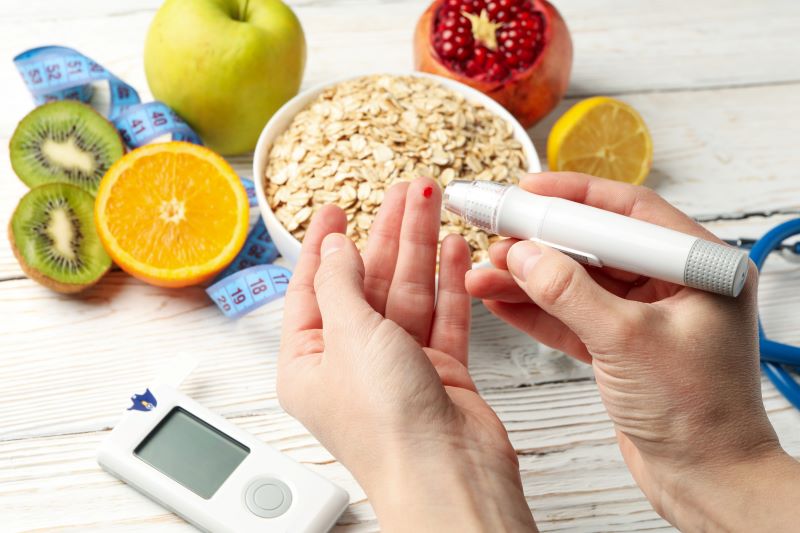What Vitamins & Supplements are Good for Diabetic Patients?

According to a study conducted by the National Library of Medicine, vitamin D plays a crucial role in maintaining normal insulin regulation. However, it's not just vitamin D that can help manage diabetes; other essential vitamins also contribute significantly to controlling this chronic disease. Ensuring an adequate intake of these vitamins can support better blood sugar levels and overall health for diabetics.
From improving insulin sensitivity to reducing inflammation, these vitamins offer a range of benefits. So, without further delay, take a look at the following recommended vitamins for diabetics to incorporate into your daily routine.

Table of Contents

Best Vitamins & Supplements for Diabetes
Managing diabetes effectively requires a holistic approach, including a balanced diet, regular exercise, and the right vitamins and supplements. The following are the most beneficial vitamins and supplements for individuals with diabetes:
Best Sources of Essential Vitamins & Supplements for Liver Health

Take a look at the table below to get a fair idea about the vital vitamins and supplements for diabetics. These nutrients support blood sugar control, improve insulin sensitivity, and enhance overall health.
Daily Intake of Vitamins & Supplements for Diabetes
Ensuring the right daily intake of essential vitamins and supplements can help manage diabetes and promote overall health. Below is a table with the recommended daily intake limits for various vitamins and supplements for different age groups.
How Do Vitamins Help with Diabetes?
There is no potential evidence to suggest any cure for diabetes, be it type 1 or type 2 diabetes. But, maintaining a healthy lifestyle and regular intake of a nutrient-rich diet can control this disease. If you wonder what nutrients you must include in your daily diet, vitamins should be included in the list.
For instance, the American Diabetes Association released a study stating that vitamin D in the blood serum reduced the risk of developing type 2 diabetes. This vitamin also helps to lose weight. Reducing obesity further prevents the risk of developing type 2 diabetes.
Patients with diabetes mellitus undergo treatment on metformin. This increases the risk of vitamin B12 deficiency. Therefore, daily intake of vitamin B12 (2.4 mcg) for patients over 50 years is essential for treating diabetic neuropathy. Take help from the list mentioned above and pick your favourite vitamin B12 rich food and curb the deficiency.
Disclaimer: Remember to consult your doctor before consuming any food to avoid health risks.
Here's a brief overview of the different types of diabetes and associated vitamins that can help you control the same.
Type 1 Diabetes: Here, the immune system affects the insulin-producing cells in the pancreas. Doctors primarily diagnose this diabetes type in children and young people.
Note the following vitamins for diabetics (type 1 diabetes):
|
Vitamins for Type 1 Diabetes |
Dosage of Vitamin |
|
Vitamin D |
15 – 20 mcg (varies with age) |
|
Vitamin B12 |
300 – 10,000 mcg (in case of deficiency) |
|
Vitamins for Type 2 Diabetes |
Dosage of Vitamin |
|
Vitamin C |
75 mg (women) – 90 mg(men) |
|
Vitamin E |
15 mg (14 years+) |
|
Vitamin B6 |
1.3 – 1.7 mg |
Gestational Diabetes: It is primarily diagnosed in pregnant women between the 24th and 28th weeks of pregnancy when their bodies cannot make enough insulin.
As per the WHO, note that consumption of vitamin D oral supplement is not recommended for pregnant women to improve maternal health. Hence, women who have gestational diabetes must consult a doctor before consuming vitamin D. However, diets with high content of vitamin C can protect them from developing gestational diabetes.
Useful Tools to Track Your Health
Role of Vitamins & Supplements for Diabetes
Vitamins and supplements play a crucial role in managing diabetes. Below is a table highlighting the benefits of essential vitamins and supplements for diabetes.
How to Support Diabetes in Your Daily Routine?

Managing diabetes involves a comprehensive approach that includes lifestyle changes, dietary adjustments, and regular monitoring of blood glucose levels. Here are some key strategies to support diabetes management:
- Maintain a Balanced Diet: Focus on consuming various nutrient-dense foods, including whole grains, lean proteins, healthy fats, fruits, and vegetables. Limit the intake of sugary and processed foods to help manage blood sugar levels effectively.
- Regular Physical Activity: Engage in at least 30 minutes of moderate exercise most days. Walking, cycling, and swimming can improve insulin sensitivity and help regulate blood glucose levels.
- Monitor Blood Sugar Levels: Regularly checking your blood sugar levels can help you understand how different foods, activities, and medications affect your glucose levels. This is crucial for making necessary adjustments to your diabetes plan.
- Take Medications as Prescribed: Adhere to your healthcare provider's recommendations regarding medications or insulin therapy. Consistent medication use helps maintain stable blood sugar levels and prevents complications.
- Stay Hydrated: Drinking plenty of water is essential for overall health and can help manage blood sugar levels. Proper hydration supports kidney function and helps flush out excess glucose through urine.
- Manage Stress: Chronic stress can negatively impact blood sugar levels. Practice stress-reducing techniques such as meditation, yoga, deep breathing exercises, or spending time in nature to maintain emotional well-being.
- Get Regular Check-Ups: Regular visits to your healthcare provider are essential for monitoring your overall health and managing diabetes. Routine check-ups can help detect any complications early and allow for timely interventions.
How to Boost Vitamin Levels for Diabetes?
Maintaining optimal vitamin levels is crucial for managing diabetes effectively and preventing complications. Here are some strategies to help boost your vitamin intake:
- Incorporate a Variety of Foods: Ensure your diet includes a wide range of fruits, vegetables, whole grains, lean proteins, and healthy fats.
- Focus on Leafy Greens: Include leafy vegetables like spinach, kale, and broccoli, which are rich in vitamins A, C, and K, as well as folate and magnesium.
- Choose Fortified Foods: Opt for foods fortified with essential vitamins, as they are a good source of vitamin D, B12, and other important vitamins for diabetics.
- Take Supplements if Needed: Consult with your healthcare provider about the need for vitamin supplements to maintain optimal health.
- Stay Hydrated: Proper hydration supports overall health and helps absorb water-soluble vitamins like B and C. Make sure to drink plenty of water.
- Limit Processed Foods: Reduce the intake of processed and sugary foods, which can interfere with absorbing essential vitamins and minerals.
Vitamin Deficiency Diseases Linked to Poor Liver Health
If you are wondering which vitamin deficiency can cause diabetes, take a look below:
Deficiency in vitamin D and vitamin A increases the risk of causing type 2 diabetes. A study released in Medical News Today said that lack of vitamin A in diet destroys beta cells. This reduces insulin production and increases the blood sugar level in the blood. Ultimately, it leads to the development of type 2 diabetes.
Vitamin D also improves insulin sensitivity. Hence, the deficiency of this vitamin increases insulin resistance, causing type 1 and type 2 diabetes. This is the primary reason why people with diabetes need vitamins.
Management of diabetes involves a modification in dietary habits and lifestyle changes. In terms of diet, make sure to include the essential vitamins for diabetics. But, consult a healthcare practitioner before making any dietary changes as well.
Effects of Long Term Vitamin Deficiency on Liver
Long-term vitamin deficiency can have serious implications for individuals with diabetes, exacerbating the condition and leading to additional health complications. A deficiency in essential vitamins such as B1, B6, B12, D, and E can impair glucose metabolism, reduce insulin sensitivity, and increase oxidative stress.
This can result in poor blood sugar control, increased risk of neuropathy, cardiovascular disease, and weakened immune function. Ensuring adequate vitamin intake is crucial for managing diabetes effectively and maintaining overall health.
Should You Take a Diabetes Health Supplement?
Deciding whether to take a diabetes health supplement should be based on individual needs and under the guidance of a healthcare provider. Supplements can help fill nutritional gaps, improve insulin sensitivity, and support overall health, particularly if your diet lacks essential vitamins and minerals.
However, they should not replace a balanced diet and healthy lifestyle. Consulting with your doctor can help determine the appropriate supplements and dosages to enhance your diabetes management plan safely and effectively.
Vitamins and supplements can help manage diabetes by improving insulin sensitivity and preventing complications. Important nutrients like B vitamins, vitamin D, magnesium, and omega-3 fatty acids support your overall health.
While a balanced diet is the cornerstone of good nutrition, supplements can provide additional support where needed. Always consult with a healthcare professional to tailor your vitamin intake to your specific needs
Protect What Matters - Explore Other Insurance Options














